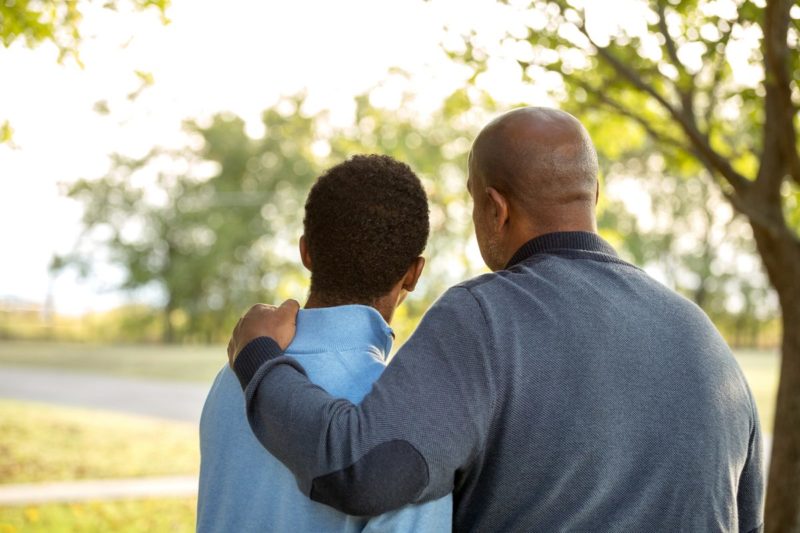The Importance of Family Support When LGBTQ Youth Come Out
The moment of coming out is not the right time for a parent or family member to begin tackling thoughts and feelings about sexual orientation and gender identity.

One of the defining features of hanging out with friends in different LGBTQ communities in San Francisco, Syracuse, and Chicago over the past two decades has been the ubiquity of coming-out narratives.
Almost like a rite of passage, evening conversations would often turn to stories of family acceptance, rejection, and occasionally violence. Larry told his grandmother first. Liz came out only to her sister. Stephane never told his aging parents.
It was clear to me during these conversations that identity disclosures had left a lasting mark, and that the sharing and retelling of the experience were ways to make sense of that often-traumatic event.
Clearly, the reaction of parents, family members, and loved ones at the moment of coming out is crucial both for the LGBTQ individual and for the future of that family relationship—during this moment, there is much at stake.
The importance and lingering nature of coming-out narratives are increasingly underscored in media centered on LGBTQ people. A new initiative, VideoOut, is inviting LGBTQ individuals to share their coming-out stories on video, including tales of family acceptance and rejection. Founder Jordan Reeves is curating them and sharing them, Reeves says on the website, to provide inspiration and encouragement for LGBTQ people by showing that these experiences are not limited to one individual. These stories are also echoed in a new Netflix fictional series One Day at a Time, featuring one character’s story of coming out at her quinceañera.
In a recent study, researchers at Northwestern University’s Institute for Sexual and Gender Minority Health and Wellbeing, where I am associate director, confirmed that the coming-out moment can play a pivotal role in young people’s mental health—and that family support for LGBTQ youth matters tremendously. Adolescence is an especially critical time for LGBTQ people, who show higher rates of suicide attempts or thoughts, substance abuse, and depression than straight and cis adolescents, and higher rates of victimization. Those who lack support show adverse mental health effects, such as increased risk for suicide, depression, and use of illicit substances. Since coming out is an event that is happening increasingly earlier in life, before youth are able to live independently, family support matters more than ever.
The Northwestern study also found that LGBTQ youth with low family support who have a strong network of support from their peers and their significant other not only showed lower levels of distress, but also experienced increased support from their family over the course of adolescence. It is possible that families become more accepting when they see their LGBTQ child supported by their peers and partner.
Even LGBTQ adolescents with low family, peer, and partner support in the study showed improvements in their mental health over the course of adolescence, suggesting their resilience in the face of adversity.
Still, many LGBTQ youth face negative reception from parents and loved ones when coming out. For example, LGBTQ youth are overrepresented in the homeless population in Chicago and across the nation. While homelessness is a complex issue that can be caused by factors like employment discrimination and mental health issues, it is most often linked among this population to family rejection and family abuse due to the teens’ sexual orientation or gender identity. This can, in turn, affect teens’ mental and physical health, current and future economic and housing situation, educational prospects and future employment, and quality and length of life.
The stakes are high, especially in the current political climate, which is marked by uncertainty about the administration’s stance on LGBTQ issues: The February White House statement in support of LGBTQ rights was followed by President Donald Trump’s rollback of federal protections for transgender students. Even more research and interventions are needed for LGBTQ youth, as the Northwestern study found, but fears surrounding the new administration may have created a chilling effect on those in the federal government who can support and fund this research and intervention. The Centers for Disease Control and Prevention, for instance, recently called off a planned LGBT Youth Summit that would have set the agenda on the topic for the next five years.
In the meantime, parents and families of children can educate themselves and each other about sexual and gender identity. According to the American Academy of Pediatrics, sexual orientation may be established in childhood but is usually manifested during adolescence. Meanwhile, gender identity can begin as early as 3 years of age. All this means parents, family, and loved ones should learn about these issues very early on in the lives of children.
The moment of coming out is not the right time for a parent or family member to begin tackling thoughts and feelings about sexual orientation and gender identity. Incredible resources are available today such as TransYouthEquality.org for parents of trans individuals; our Northwestern IMPACT Program’s site for parents, caregivers, and families of LGBT people; and websites tailored to specific groups such as Christian parents of LGBTQ youth. Organizations such as PFLAG, a national group linking LGBTQ people to their families, friends, and allies, also educate families through the coming out process and help them become supportive networks for their LGBTQ loved ones.
These resources help parents and families learn that LGBTQ identities are healthy variations of human gender and sexuality, so that they can create a supportive and caring environment for their children of any gender and sexual identity.
